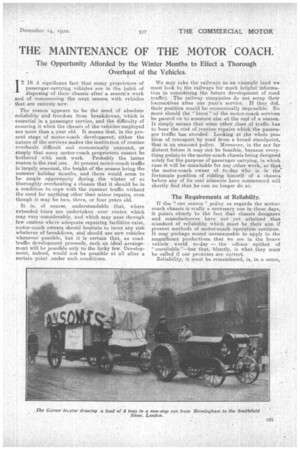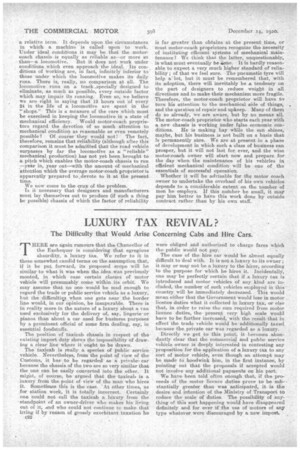THE MAINTENANCE OF THE MOTOR COACH.
Page 15

Page 16

If you've noticed an error in this article please click here to report it so we can fix it.
The Opportunity Afforded by the Winter Months to Effect a Thorough Overhaul of the Vehicles.
IT IS A significant fact that many proprietors of passenger-carrying vehicles are in the habit of disposing of their chassis after a season's work and of commencing the next season with vehicles that are entirely new.
The reason appears to be the need of absolute reliability and freedom from breakdowns, which is essential in a passenger service, and the difficulty of ensuring it when the chassis o'f the vehicles employed are more than a year old. It means that, in the present stage of motor-coach development, either the nature of the services makes the institution of routine overhauls difficult and economically unsound, or simply that many motor-coach proprietors cannot be -bothered with such work. Probably the latter reason is the real one. At present motor-coach traffic is largely seasonal, the height of the season being the summer holiday months, and there would seem to be ample opportunity during the winter of so thoroughly overhauling a chassis that it should be in a condition to cope with the summer traffic without the need for anything other than minor repairs, even though it may be two-, three, or four years old.
It is, of course, understandable that, where extended tours are undertaken over routes which may vary considerably, and which may pass through few centres where adequate repairing facilities exist, motor-coach owners should hesitate to incur any risk whatever of breakdown, and-should use new vehicles whenever possible, but it is certain that, as roadtraffic development proceeds, such an ideal arrangement will be possible only to the lucky few: Development, indeed, would not be possible at all after a certain point under such conditions. We may take the railways as an example (and we must look to the railways for much helpfulinformation in considering the future development of road traffic). The railway companies do not scrap their locomotives after one year's service. If they did, their position would be economically impossible. No more should the "locos " of the motor-coach services be passed en to someone else at the end of a season. It simply means that some other class of traffic has to bear the cost of routine repairs which the passenger traffic has avoided. Looking at the whole pro. blem of transport by road from a broad standpoint, that is an unsound. policy. Moreover, in the not far distant future it may not be feasible, because everything points to the motor-coach chassis being designed solely for the purpose of passenger carrying, in which case it will be unsuitable for any other work, so that the motor-coach owner of to-day who is in the fortunate position of ridding himself of a chassis before any of its real ailments have commenced will shortly find that he. can no longer do so.
The Requirements of Reliability.
If the "one season" policy as regards the motorcoach chassis is really a necessary, one in these days, it points clearly to the fact that chassis designers and manufacturers have not yet attained that standard of reliability which must be their aim if present methods of motor-coach operation continue. It may perhaps sound unreasonable to apply to the magnificent productions. that we see in the heavy vehicle world to-day — the odious epithet of "unreliable "—but that, bluntly, is what they must be called if our premises are correct.
Reliability, it must be remembered, is, in a sense, a relative term. It depends upon the circumstances in which a machine is called upon to work. Under ideal conditions it may be that the motorcoach chassis is equally as reliable as—or more so than--a locomotive. But it does not work under conditions which even approach the ideal. Its conditions of working are, in fact, infinitely inferior to those under which the locomotive makes its daily runs. There is, really, no comparison at all. The locomotive runs on a track _specially designed to eliminate, as much as possible, every outside factor which may impair its running. Even so, we believe we are right in saying that 12 hours out of every 24 in the life of a locomotive are spent in the " shops." This is a measure of the care which must be exercised in keeping the locomotive in a state of mechanical efficiency. Would motor-coach proprietors regard the devotion of so much attention to mechanical condition as reasonable or even remotely possible? Of course they would not The fact, therefore, remains that reliability (although after this comparison it must be admitted that the road vehicle surpasses by far the locomotive as a "reliable" mechanical production) has not yet been brought to a pitch which enables the motor-coach chassis to run —year in, year out—with the amount of mechanical attention which the average motor-coach proprietor is ap-parently prepared to devote to it at the present time.
We now come to the crux of the problem. Is it necessary that designers and manufacturers must lay themselves out to produce (if such a thing be possible) chassis of which the factor of reliability
is far greater than obtains at the present time, or must motor-coach proprietors recognize the necessity of instituting efficient systems of mechanical maintenance ? We think Oast the latter, unquestionably, is what must eventually be ione. It is hardly reasonable to expect a very much higher standard of reliability; of that we feel sure. The pneumatic tyre will help a'lot, but it must be remembered that, with its adoption, there will inevitably be a tendency on the part of designers to reduce weight in all cli;seetions and to make their mechanism more fragile. Therefore, the motor-coach proprietor will have to turn his attention to the mechanical side of things, and the question of repair and upkeep. Many of them do so already, we are aware, but by no means all. The motor-coach proprietor who starts each year with a new chassis is working under false economic conditions. He is making hay while the sun shines, maybe, but his business is not built on a basis that is permanently sure. We are at present in a phase of development in which. such_ a class of business can prosper, but it will not last for ever, and the wise motor-coach owner will start now and prepare for the day when the maintenance of his vehicles in efficient mechanical condition will be one of the essentials of successful operation.
Whether it will be advisable for the motor coach owner to undertake the overhaul of his own vehicles depends to a considerable extent on the number of men ho employs. If this nuf-nber be small, it may pay him better to have this work done by outside contract rather than by his own staff.






























